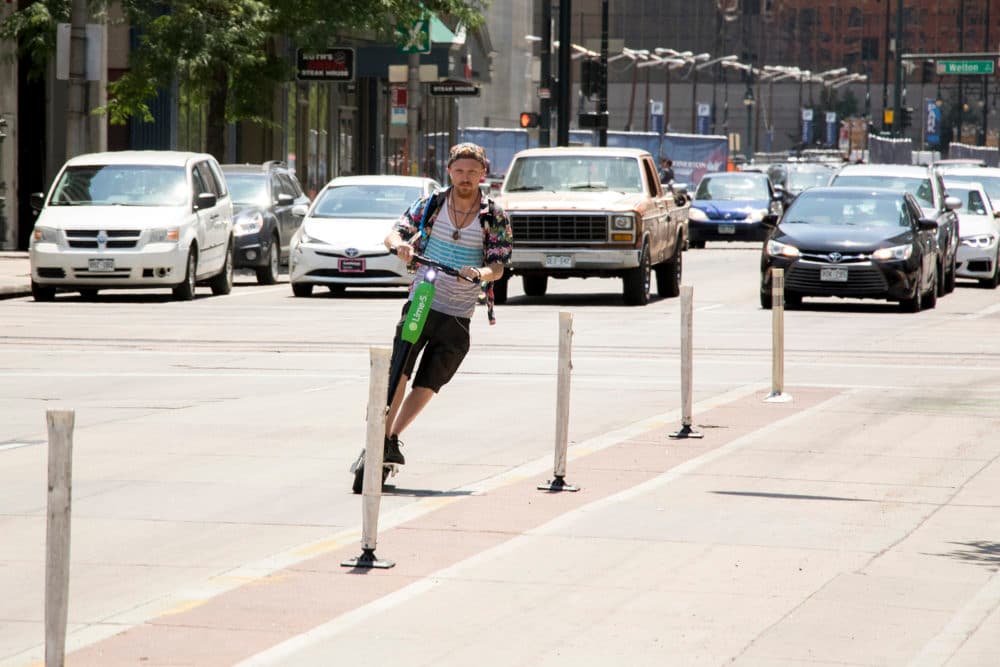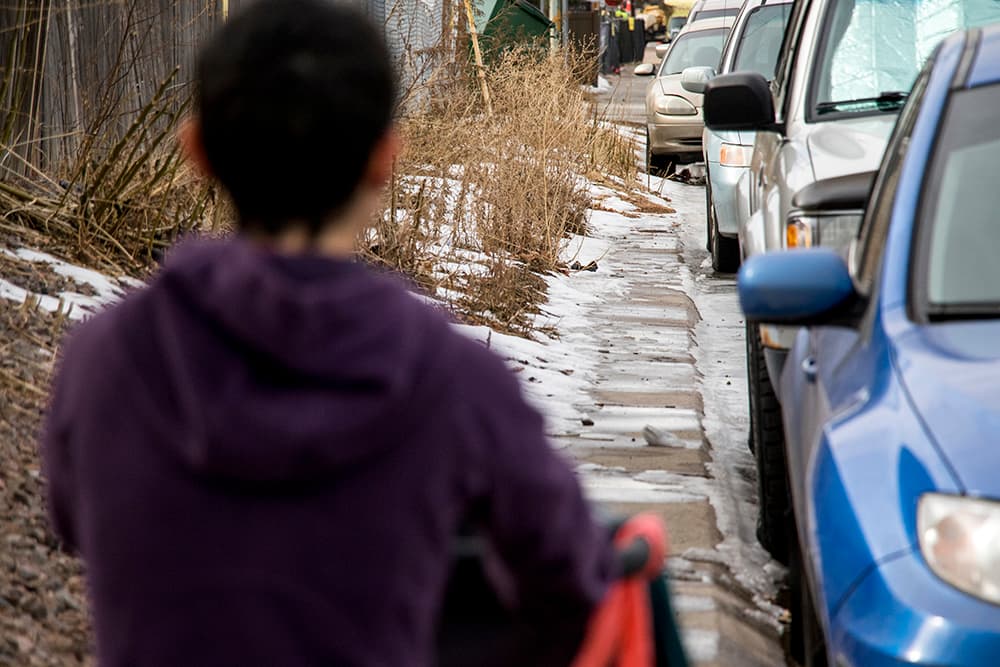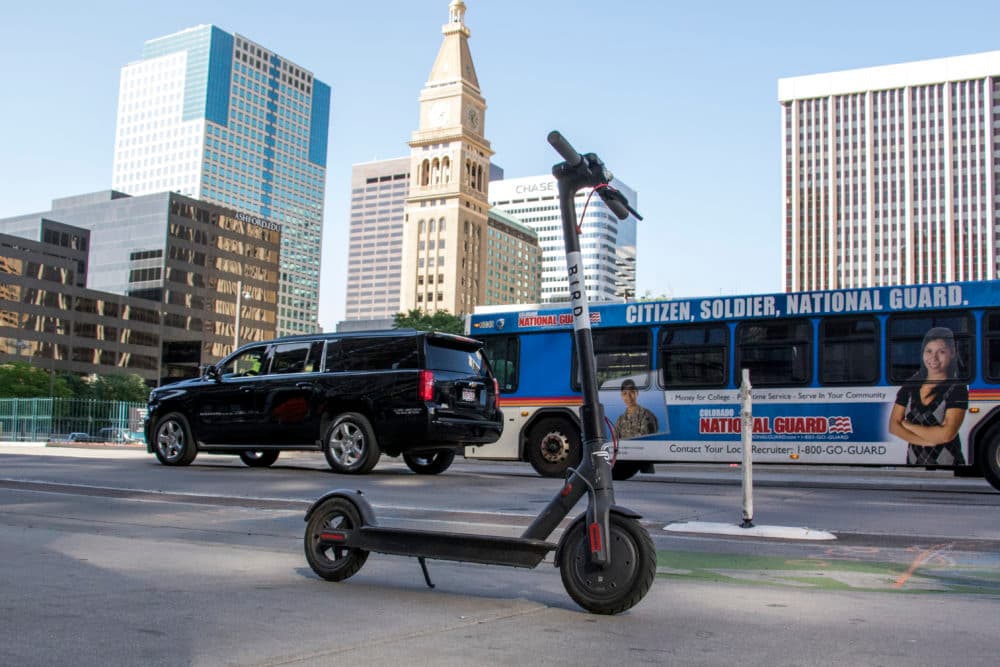July 17, 2018: It's day 54 of the Denver Scooter Wars. The streets have been temporarily cleared of the dockless electric scooters that arrived here by surprise many long, hot weeks ago. The city has formed a plan. Permits have been submitted. And people keep emailing the mayor.
For a moment, it's been kind of peaceful. As we rest briefly under the yellow sky of the hurricane's eye, let's tackle some big questions.
Did "disrupt first" work?
Sure seems like it.
Or, put a less tech-y way: Scooter companies asked for forgiveness, not permission, and essentially got both. Because once people got a taste, a lot of them really liked it.
Two weeks after Denver Public Works ordered the scooters off the streets so it could deal with a lack of regulations for such vehicles, the department announced that it was working on a pilot program for “dockless mobility technology” that would allow companies like Lime and Bird to operate "in a way that respects our public spaces and meets Denver’s mobility goals, as outlined in the city’s Mobility Action Plan.” In that time, Public Works confiscated more than 300 scooters and wrote 264 tickets.
The city began developing the program through its Transit Amenities Program, which allows for amenities at bus and rail stops. RTD has been involved in the conversation, as have the scooter companies.
As of today, eight companies have submitted permit applications for scooters.
They are: Lime, Bird, Lyft, Spin, Razor, Skoot, Jump and Dropbike. Public Works has also received five permit applications for dockless bikes from Lyft, Zagster, Jump, Ofo and Dropbike.
According to a pilot program overview document, five companies will be permitted. Each will at first be allowed to deploy up to 250 dockless vehicles and will be allowed to bring the total up to 350 if 100 of the vehicles are committed to staying in designated "opportunity areas."
Public Works is still reviewing applications, which public information specialist Heather Burke pointed out came in "within a short timeframe." It's all happening — fast.

"It creates buzz. You get your product out there," said Brandon Bordenkircher, who recently co-authored a report on dockless electric scooter regulation across the country for his company, Twelve Tone Consulting.
At the top of the report is a much-circulated quote from Relativity Media founder Ryan Kavanaugh: “The key is to embrace disruption and change early. Don’t react to it decades later. You can’t fight innovation.” In it, he and co-authors Kirstin Anderson-Hall and Riley O'Neil look at the tactics of 13 scooter companies and the responses to them in cities across the country.
"I think that only goes so far," Bordenkircher said. "I think you need to work with cities. You need to work, more importantly, with the communities. You can’t just drop thousands of bikes like they did in Dallas. Dallas doesn’t have the structure, people didn’t know what to do with them. You need to go there, make that connection and find out what they need."
And speaking of which...
How do we expect people to use dockless scooters and bikes?
As of right now, the answer seems to be that Denver hopes the vehicles will be first- and last-mile solutions, meaning travelers will be expected to use them to get to and from transit stops.
One of six goals of what's officially called the Dockless Mobility Vehicle Pilot Program is to "increase the percentage of people who have access to and take public transit." Here's what the program overview has to say about parking requirements:
Earlier this month, RTD assistant general manager of communications Scott Reed told Denverite that RTD is staying in touch with the city as the program gets underway and will be "getting permits issued to the various service providers regarding how they will interact with RTD and what their responsibilities are with removing scooters and bikes and making sure they are not blocking egress."
Internally, he said, RTD is putting together a facility-by-facility policy addressing where scooters can be parked and picked up. They'll likely have designated areas at major transit stations, park-n-rides and light rail stops. The catch: those are the only stops RTD can actually control. Small bus stops, for one thing, are under the control of whichever municipality they're in.
But if you watch social media for scooter chatter (as is the choice or professional obligation of many) you've probably seen some push-back against a transit-oriented approach to scooters. Some people just want to use the scooters for their full trip — to a park, up the Cherry Creek Trail into downtown or maybe straight to the office. The city's plan pushes those uses to the background and in some cases forbids them — and that brings us to another big question:
Is restricting electric scooters to the sidewalks a good idea?
The scooters can move as fast as 15 mph, and Denver's sidewalks are in notoriously rough shape. Also, sometimes people walk on them.

"I think you folks were having the issue because people were riding in the street and not the sidewalks, which is pretty much opposite of everyone else," Bordenkircher said. "We cite you folks in Denver as the only place that requires [riding on the sidewalk]."
When Public Works first ordered the scooters off the streets on June 1, it also sent a message to the public that, "via city rules and ordinances, these scooters are not allowed to operate in the roadway except to cross the street at an intersection, nor are they allowed in bike lanes, on the city’s trail system, or in city parks."
That eliminates a lot of places you might like to ride a scooter and leaves only our frequently crumbling, uneven or narrow sidewalks. Some areas of Denver have no sidewalks at all.

"Riding on the sidewalk with something that moves that fast -- it deserves a bike lane," O'Neil said, though he can also see why a rider might feel safer on a sidewalk in some environments.
A sidewalks-only rule makes more sense in suburban or rural areas, Bordenkircher said, pointing to a possible law change in California that would allow electric scooters on sidewalks or streets in order to create a safer environment in places with no bike infrastructure and very busy streets.
"After we get the pilot off the ground, Denver Public Works will begin comprehensive discussions about the current ordinance language that relegates scooter use to sidewalks," Burnes said in an email. "Denver ordinance text also mirrors current state statute language regarding where 'toy vehicles' can operate, so we are researching possibilities and implications for any changes. Regardless, the pilot program will provide a forum for discussion as well as feedback/observation to inform a final decision."
She also noted that users of the permitted vehicles are required to yield to pedestrians and that Public Works is working with the Denver Police Department on enforcement.
Is any of this working in other cities?
"The electric scooter share model itself is so new and so unanticipated by city governments, city officials, traffic engineers," O'Neil said. "... Electric scooters can solve a lot of problems. Unfortunately, a lot of cities have had negative feedback."
According to Twelve Tone Consulting's report, six cities issued cease-and-desist letters to dockless electric mobility companies, including Denver, San Francisco, Nashville, Honolulu, Charlotte., N.C., and Scottsdale, Ariz.
It highlighted Lime's arrival in Denver as particularly brazen and the city's response as typical of governments that are challenged to react quickly:
"One city where it’s been doing fairly well and has been there for a while has been Washington, D.C.," O'Neil said. "West coast cities have bad stories. I haven’t seen any of those in Washington, D.C."
He's unsure whether the district did anything differently that made their arrival smoother, or if it's just the kind of city prepared to handle the technology — an old city with not as much car traffic, old streets and an existing bike share program. Cities with newer streets and car-oriented lifestyles didn't handle it as well, he said.
Denver might also consider keeping an eye on San Francisco, where they're in the same position. They'll soon permit five companies out of a dozen that applied, and as the city develops its own rules, it will serve as an example. And since Denver is operating on a similar timeline, other cities may look at us as an example, too.
From there, O'Neil said, it's just a matter of time until things feel normal.
"Everyone will accept it and it will be used properly," he said. "It’s just going to take some time."
Anyone who would like to offer input on the development of the pilot program can email [email protected].
Lime, Bird and Ofo did not respond to requests for comment for this story.













